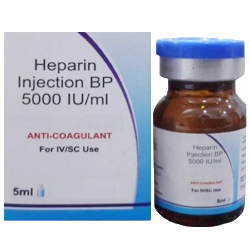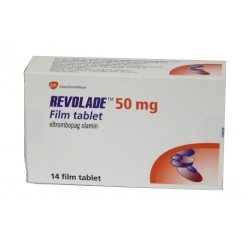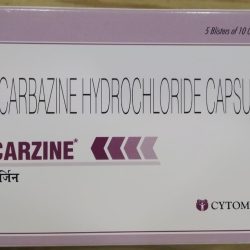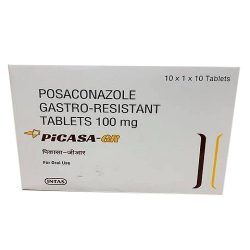Description
Heparin Uses:
Heparin injection is an anticoagulant used for:
- Prophylaxis and treatment of pulmonary embolism and venous thrombosis.
- Prevention of pulmonary embolism and postoperative deep venous thrombosis in patients undergoing major abdominothoracic surgery or who, for other reasons, are at risk of developing thromboembolic disease.
- Atrial fibrillation with embolization.
- Treatment of acute/chronic consumptive coagulopathies (disseminated intravascular coagulation).
- Clotting prevention in arterial and cardiac surgery.
- Prophylaxis and treatment of peripheral arterial embolism.
- Use as a blood thinner in blood transfusions, extracorporeal circulation, and dialysis procedures.
Dosage:
Heparin may be administered by intermittent intravenous injection, intravenous infusion or deep subcutaneous injection. It should not be administered intramuscularly due to the danger of haematoma formation.
Low dose prophylaxis against postoperative venous thromboembolism: The usual dose of Heparin is 5,000 units by deep subcutaneous injection 2 hours prior to the surgery and repeated every 8-12 hours for one week or longer until the patient is fully ambulatory.
Adults: Therapy of established venous thrombosis or pulmonary embolism. Therapy may be given by the following routes:
- Continuous intravenous infusion: a bolus dose of 5,000 units may be administered initially followed by an infusion of 20,000 to 40,000 units over 24 hours.
- Intermittent intravenous injection: an initial dose of 10,000 units followed by 5,000 to 10,000 units every 4-6 hours may be given.
- Deep subcutaneous injection: the usual dose is 5,000 units administered intravenously followed by subcutaneous injection of 10,000 units 8 hourly or 15,000 units 12 hourly. A concentrated form of heparin injection needs to be used (eg. 25,000 units/mL).
Paediatric Population: A suggested dosage of Heparin is 50 units per kg body weight initially given by I.V. infusion followed by 100 units per kg body weight every 4 hours as per the clotting time. For single patient use. Use once only and discard any residue.
Side Effects:
The most commonly reported side effects due to Heparin Sodium Injection include:
- hemorrhage
- thrombocytopenia
- HIT and HITTS
- injection site irritation
- general hypersensitivity reactions
- elevations of aminotransferase levels
Warnings and Precautions:
- The heparin 25000 IU or 5000 IU treatment should not be given by intramuscular injection, because of the risk of haematoma formation.
- Vials of Heparin injection contain benzyl alcohol as a preservative, and should not be given to premature or low birth-weight neonates. Benzyl alcohol has been linked with deaths in these patients.
- Frequently monitor patients for signs/symptoms of neurological impairment. In case neurological compromise is observed, urgent treatment is required.
- As this medicine is derived from animal tissue, use is with caution in patients with a previous history of allergy or asthma. Prior to a therapeutic dose being given to such a patient, a trial dose of 1,000 units may be required.
- Heparin is required to be used with extreme and precise caution in patients with continuous tube drainage of the stomach or small intestine.
- Any kind of action which may be responsible for causing vascular injury, with the exception of necessary intravenous or subcutaneous injections, needs to be avoided where possible.
- Administer Heparin with caution to patients with hepatic or renal disease, a history of ulcers, hypertension, other organic lesions liable to bleed, endocarditis, hemostasis disorder, vascular diseases of the chorio-retina or during the eye surgery. Reduction in dosage may be needed in patients with hepatic or renal disease.
- Heparin treatment increases the risk of localised haemorrhage while on and following oral surgical (dental) procedures. Temporary dosage reduction or withdrawal may therefore be required prior to oral surgery.
- Therapy with Heparin should be assessed carefully. Apt monitoring of therapy reduces the probability of overdosage and consequent probability of haemorrhage and is a necessary guide to the development of severe side effects such as delayed onset thrombocytopenia.
- Thrombocytopenia may occur in patients treated with heparin injection and may appear from 4 to 21 days after the initiation of treatment, although it may emerge sooner in case there is a history of heparin induced thrombocytopenia. Any degree of thrombocytopenia needs to be assessed precisely.
- Platelet count should be checked at the start of therapy with heparin 5000 iu injection and then monitored regularly until the end of therapy. Heparin treatment should be interrupted and an alternative therapy should be started in case the platelet count drops below 100,000/mm3.
- Heparin-induced Thrombocytopenia (HIT) and Heparin-induced Thrombocytopenia and Thrombosis (HITT) can emerge up to some weeks after the interruption of heparin therapy. Patients with thrombocytopenia or thrombosis after interruption of heparin needs to be evaluated for HIT & HITT.
- Dosage of heparin should be reduced in elderly individuals. Patients aged 65 years or older, mainly women, may be more susceptible to haemorrhage during therapy with heparin. Patients must be carefully monitored.
- Although heparin treatment does not cross the placenta, it should be used with caution during pregnancy, particularly during the last trimester, and withdrawn 1 or 2 days prior to the delivery date, because of the probability of fetal-maternal hemorrhage.
- Heparin is not distributed into milk and is therefore not contraindicated in women who are breastfeeding. However, use by breastfeeding women has rarely been observed to cause rapid (within 2-4 weeks) development of severe osteoporosis and vertebral collapse.





